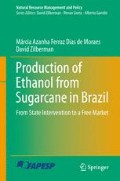Abstract
In 1998, the crisis of ethanol overproduction remained entrenched leading to an overall drop in income within the sugarcane ethanol industry. Consequently, in 1999, there was intense movement by the parties involved on the industry side (sugarcane suppliers, mayors of sugarcane-producing municipalities, trade associations, and workers in the industry). The aim was to raise awareness at the highest levels of government, as well as in Brazilian society at large, about the problems and benefits arising from the production of sugarcane, sugar, and ethanol. Among the actions taken were public protests, which occurred in several sugarcane-producing municipalities, and the signing of the “Pact for Full Employment in the Sugarcane Ethanol Industry”, as previously mentioned (end of Chap. 3).
Access this chapter
Tax calculation will be finalised at checkout
Purchases are for personal use only
Notes
- 1.
The congressmen in attendance were Luís A. de Medeiros, Roberto Balestra, Francisco Graziano, João Herrmann Neto, and José Machado; representing the workers were the trade unionists Paulo Pereira da Silva (president of the Trade Union Council and of the Metalworkers Union of São Paulo), Danilo Pereira (president of the Federation of Chemical and Pharmaceutical Industry Workers), Melquíades de Araujo (vice-president of Trade Union Council and coordinator of the event), and Anthony Vitor (coordinator of the “Raising our Voices against Unemployment and for Production” event in Ribeirão Preto); representing the local governments was the congressman Antônio Mendes Thame (president of theSão Paulo State Association of Sugarcane- and Ethanol-Producing Municipalities); and the representatives of the suppliers were Antônio Celso Cavalcanti de Andrade(president of the Federation of Sugarcane Growers in Brazil) and Maria Christina Pacheco (executive vice-president of ORPLANA).
- 2.
In São Paulo, as in some other megacities around the world, in which traffic congestion has become a serious problem, there is a law that prevents private passenger vehicles from being driven during peak traffic hours one weekday per week, according to a rotation schedule, which is based on the final digit of the license plate number.
Author information
Authors and Affiliations
Corresponding author
Rights and permissions
Copyright information
© 2014 Springer International Publishing Switzerland
About this chapter
Cite this chapter
Ferraz Dias de Moraes, M., Zilberman, D. (2014). Interested Parties Come to the Defense of the Sugarcane Ethanol Industry. In: Production of Ethanol from Sugarcane in Brazil. Natural Resource Management and Policy, vol 43. Springer, Cham. https://doi.org/10.1007/978-3-319-03140-8_10
Download citation
DOI: https://doi.org/10.1007/978-3-319-03140-8_10
Published:
Publisher Name: Springer, Cham
Print ISBN: 978-3-319-03139-2
Online ISBN: 978-3-319-03140-8
eBook Packages: Business and EconomicsEconomics and Finance (R0)

